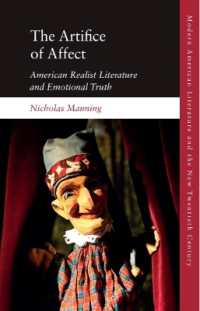- ホーム
- > 洋書
- > 英文書
- > Science / Mathematics
Full Description
Over 500,000 years ago, a single gene mutated. It spread over time, becoming critical in the journey that transformed our earliest ancestors into fully modern humans, capable of navigating the entire planet and beyond.
A few thousand years ago, humans started outsourcing knowledge to writing, displacing art and music from the heart of learning.
This is the extraordinary story of a gene that makes us uniquely human. Dr Lynne Kelly recounts how a widespread congenital disorder was the critical clue she and her collaborators needed to identify this gene as the supergene that has long eluded researchers into human cognition.
The knowledge gene supercharged our ability to learn and share knowledge with others, explaining the prodigious memories of Indigenous people the world over. The knowledge gene unlocks many other puzzles too. It explains for the first time why humans are the only species to make art, offers new insights into the earliest music and storytelling, and discusses the cognitive strengths of neurodivergent people.
The Knowledge Gene shows that we can all access the full power of our memories, without giving up any of the advantages of writing and technology. The implications for learning and creativity at any age are profound.
Contents
Foreword by Tlingit Elder Dave Kanosh
List of figures in the text
1. Knowledge makes us human
2. Illuminating an ancient knowledge gene
3. A fresh look at Indigenous memory systems
4. Why oral cultures mark their landscapes
5. The oral knowledges skill set
6. Questions about neurodiversity
7. The prehistory of music through a knowledge gene lens
8. Prehistoric art and the knowledge gene
9. The monumental story of knowledge spaces
10. The impact of literacy on our knowledge gene skills
11. Putting our knowledge gene to work
Where to from here?
Appendix: The knowledge gene skill set
Acknowledgements
Notes
Index






